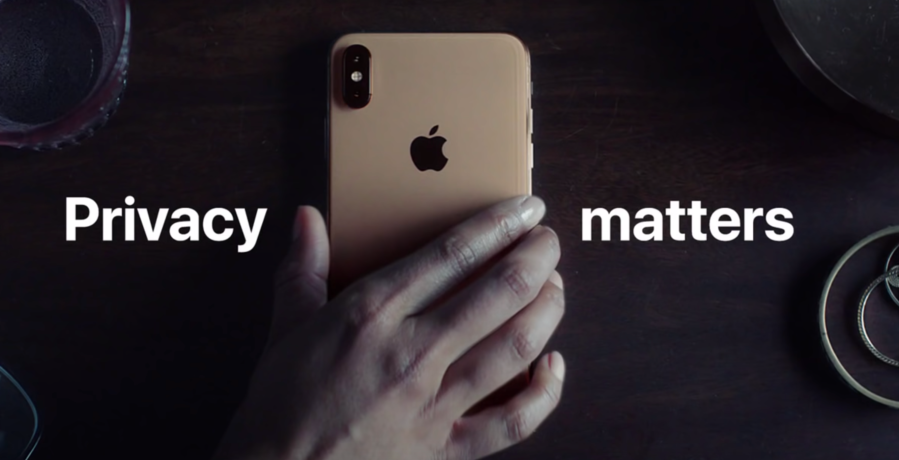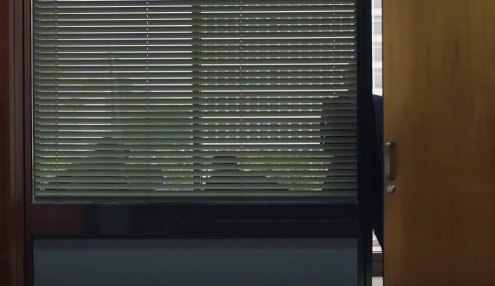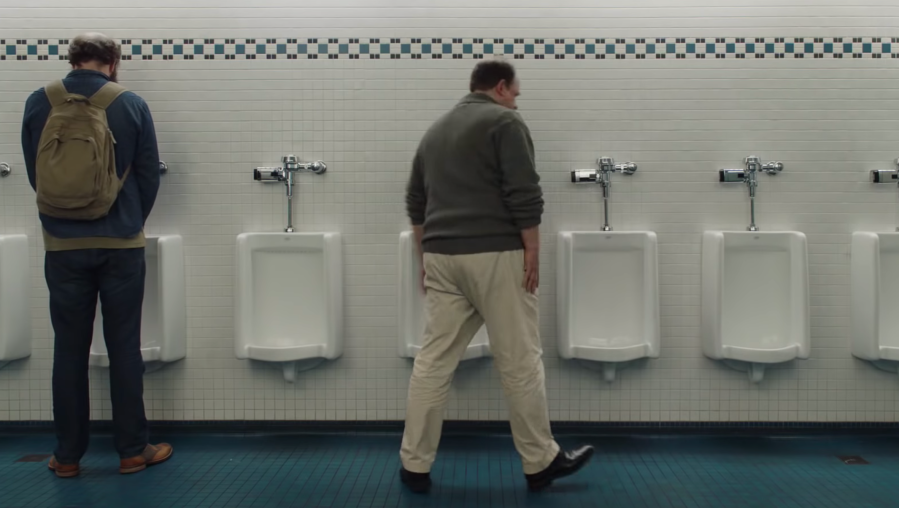“Privacy matters” – Apple’s epic privacy advertisement came barreling across the screen while watching Hulu. Their bold stance on privacy was shocking.

Apple’s ad campaign ends with the words: “If privacy matters to your life, it should matter to the phone your life is on. Privacy. That’s iPhone.” These words alone are powerful and it’s even more reinforced with the imagery and musical choice.
 This ad starts off with quick shots of “Private Property,” “Keep out” and “No Trespassing.” A bit of comic relief is thrown in with a “Beware of Dog” sign that pans down to a tiny, harmless, chihuahua. By having these signs, Apple is comparing everyday use cases to digital privacy.
This ad starts off with quick shots of “Private Property,” “Keep out” and “No Trespassing.” A bit of comic relief is thrown in with a “Beware of Dog” sign that pans down to a tiny, harmless, chihuahua. By having these signs, Apple is comparing everyday use cases to digital privacy.
Property ownership and privacy in the home has an established legal and social history, that exudes the notion of privacy. It starts as far back as the 4th Amendment, which prevents the government from entering a person’s home without a warrant. Your home, where you sleep, and what you do in your own home, are reasonable places where an average individual understands to be private. (I.e. we have a reasonable expectation of privacy in our own homes.) Apple takes this socially accepted concept and overlaps it with the iPhone.
The music tips in, consisting of high short notes, similar to the opening music of a cartoon show called the Pink Panther. The Pink Panther, for those of you who don’t know, features a pink cartoon panther who portrays a detective: Inspector Jacques Clouseau. He must be quiet and sly to find the clues. Likewise, this type of music instills the notion of being quiet, private, and sly.
Next is a montage of various everyday events where an average person, would desire privacy. It begins with two men speaking quietly at a diner when a waitress interrupts them. They shrink back inconspicuously, alluding to their desire to keep their conversation private (and not audible to the waitress.) You can easily imagine them gossiping or talking about a topic that they wouldn’t necessarily want a waitress to overhear. Even though this is in public, which is arguably in a space that is not private, we can relate to this innate scene.



Then it moves towards a business setting where a file cabinet is locked with a key. After this, a group of suited business employees run into an office room and shut the blinds abruptly. Both of these business-oriented images provide relatable situations in a workplace, where an employee may have a reasonable desire and expectation of privacy. This idea of having privacy in a workplace actually has differing degrees of enforceability but in general, we can relate to this notion of confidentiality.


After the office scene, the ad displays a teenager slamming a door with the words “Keep Out” written by her, in marker, on ripped notebook paper. At this point, Apple has covered privacy in regards to conversations in public, property, and the workplace.
 By emphasizing on a teenager and the slammed door, the ad is commenting on a teenage stereotype. This being that teenagers desire privacy and want to develop autonomy away from their parents and siblings. The second scene in this realm displays a young girl, who is reading a note passed from a fellow student. The teacher catches her, and to maintain the note’s confidentiality…she eats it. This humorous act has an underlining statement – the notion of privacy and the need for it, starts at a young age, even if it’s as silly as eating a classmate’s note.
By emphasizing on a teenager and the slammed door, the ad is commenting on a teenage stereotype. This being that teenagers desire privacy and want to develop autonomy away from their parents and siblings. The second scene in this realm displays a young girl, who is reading a note passed from a fellow student. The teacher catches her, and to maintain the note’s confidentiality…she eats it. This humorous act has an underlining statement – the notion of privacy and the need for it, starts at a young age, even if it’s as silly as eating a classmate’s note.

The clips after this include more items closing such as a door’s peephole and a sign stating “occupied.” This occupied sign transitions to a bathroom scene. It begins with a man using a urinal, Then, another man enters and the first man’s body language indicate his desire for privacy while urinating. This is yet another situation, where Apple focuses on a commonly relateable situation – most people have a reasonable expectation of privacy when using the restroom. It also provides a bit of comic relief.

After this, the commercial shows various locking mechanisms like a window lock and car door window closing. Specifically, the ad shows a woman is putting on makeup while looking at her car’s passenger mirror. She sees a man looking at her through his car window. Her expression and body language make it clear that she doesn’t want to be seen and she quickly rolls up the window. Arguably, there is no reasonable expectation of privacy when you’re out in public and the court even places a different level of privacy standards when it comes to cars – However, the scene still feels relatable. Apple is playing on the viewers’ emotions and wants you to feel as awkward as the woman does.
The ending imagery solidifies the message by transforming Apple’s logo into a lock. Here, the leaf portion “locks” into the apple. By doing this, Apple is demonstrating its desire to harmonize their product with privacy.

This advertisement looks to be part of a larger privacy campaign. On March 4th, Apple purchased the domain name privacyisimportant.com. Apple CEO, Tim Cook stated, “We’ve always viewed privacy as a human right and in this country, we view it that it’s ingrained in the Constitution.”It’s interesting that Cook quotes the Constitution here. We actually don’t have privacy explicitly in the Federal Constitution, but we do have a privacy right described in the California State Constitution (and a few other State Constitutions.) In general, privacy has been derived through case law and legislation while interpreting pieces of the Constitution. Also, it has been shaped by social awareness and political administrations.
This ad campaign provides a prime example of this shifting social awareness. The average consumer viewed tech giants as the enemy to privacy. With Facebook’s incident and security breaches happening all the time, there hasn’t been much trust from a consumer’s standpoint. However, understanding this, Apple is capitalizing on the timing and is attempting to solidify themselves as THE advocate of privacy in tech.
To my surprise, this isn’t the first advertisement of its kind. In 2012, Microsoft ran an advertisement that promoted privacy and anti-tracking tools. It stated, “Your privacy is our priority.” More recently, Microsoft CEO Satya Nadella said it was a human right.
Some media scholars have said that advertisements are meant to be a slice of life. Likewise, this advertisement is portraying the public’s need for privacy. The portrayal of our everyday physical life is purposefully put on display, in conjunction with the iPhone. It’s there to prove that our everyday privacy expectations should be reflected in our digital life. Hopefully, this transition is arriving faster than we expect and soon consumers will see the value, and demand it.




[…] you recall, back in March of 2019, Apple introduced a wide marketing campaign to combine the thoughts of privacy and security, synonymo… Considering this, the photo scanning feature seems to be at odds with this campaign. That said, […]
LikeLike